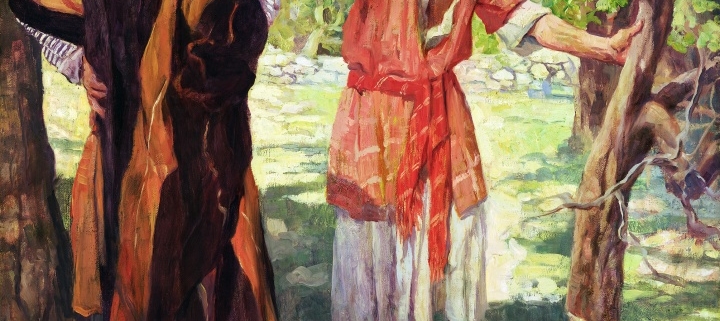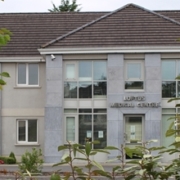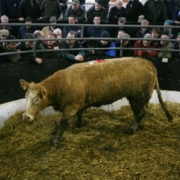Gospel, readings and reflection 20.3.22
Lectionary: 30
Reading I
Moses was tending the flock of his father-in-law Jethro,
the priest of Midian.
Leading the flock across the desert, he came to Horeb,
the mountain of God.
There an angel of the LORD appeared to Moses in fire
flaming out of a bush.
As he looked on, he was surprised to see that the bush,
though on fire, was not consumed.
So Moses decided,
“I must go over to look at this remarkable sight,
and see why the bush is not burned.”
When the LORD saw him coming over to look at it more closely,
God called out to him from the bush, “Moses! Moses!”
He answered, “Here I am.”
God said, “Come no nearer!
Remove the sandals from your feet,
for the place where you stand is holy ground.
I am the God of your fathers, “ he continued,
“the God of Abraham, the God of Isaac, the God of Jacob.”
Moses hid his face, for he was afraid to look at God.
But the LORD said,
“I have witnessed the affliction of my people in Egypt
and have heard their cry of complaint against their slave drivers,
so I know well what they are suffering.
Therefore I have come down to rescue them
from the hands of the Egyptians
and lead them out of that land into a good and spacious land,
a land flowing with milk and honey.”
Moses said to God, “But when I go to the Israelites
and say to them, ‘The God of your fathers has sent me to you,’
if they ask me, ‘What is his name?’ what am I to tell them?”
God replied, “I am who am.”
Then he added, “This is what you shall tell the Israelites:
I AM sent me to you.”
God spoke further to Moses, “Thus shall you say to the Israelites:
The LORD, the God of your fathers,
the God of Abraham, the God of Isaac, the God of Jacob,
has sent me to you.
“This is my name forever;
thus am I to be remembered through all generations.”
Responsorial Psalm
R. (8a) The Lord is kind and merciful.
Bless the LORD, O my soul;
and all my being, bless his holy name.
Bless the LORD, O my soul,
and forget not all his benefits.
R. The Lord is kind and merciful.
He pardons all your iniquities,
heals all your ills,
He redeems your life from destruction,
crowns you with kindness and compassion.
R. The Lord is kind and merciful.
The LORD secures justice
and the rights of all the oppressed.
He has made known his ways to Moses,
and his deeds to the children of Israel.
R. The Lord is kind and merciful.
Merciful and gracious is the LORD,
slow to anger and abounding in kindness.
For as the heavens are high above the earth,
so surpassing is his kindness toward those who fear him.
R. The Lord is kind and merciful.
Reading II
I do not want you to be unaware, brothers and sisters,
that our ancestors were all under the cloud
and all passed through the sea,
and all of them were baptized into Moses
in the cloud and in the sea.
All ate the same spiritual food,
and all drank the same spiritual drink,
for they drank from a spiritual rock that followed them,
and the rock was the Christ.
Yet God was not pleased with most of them,
for they were struck down in the desert.
These things happened as examples for us,
so that we might not desire evil things, as they did.
Do not grumble as some of them did,
and suffered death by the destroyer.
These things happened to them as an example,
and they have been written down as a warning to us,
upon whom the end of the ages has come.
Therefore, whoever thinks he is standing secure
should take care not to fall.
Verse Before the Gospel
Repent, says the Lord;
the kingdom of heaven is at hand.
Gospel
Some people told Jesus about the Galileans
whose blood Pilate had mingled with the blood of their sacrifices.
Jesus said to them in reply,
“Do you think that because these Galileans suffered in this way
they were greater sinners than all other Galileans?
By no means!
But I tell you, if you do not repent,
you will all perish as they did!
Or those eighteen people who were killed
when the tower at Siloam fell on them—
do you think they were more guilty
than everyone else who lived in Jerusalem?
By no means!
But I tell you, if you do not repent,
you will all perish as they did!”
And he told them this parable:
“There once was a person who had a fig tree planted in his orchard,
and when he came in search of fruit on it but found none,
he said to the gardener,
‘For three years now I have come in search of fruit on this fig tree
but have found none.
So cut it down.
Why should it exhaust the soil?’
He said to him in reply,
‘Sir, leave it for this year also,
and I shall cultivate the ground around it and fertilize it;
it may bear fruit in the future.
If not you can cut it down.’”
Reflection:-
Sir, leave it for this year also, and I shall cultivate the ground around it and fertilize it; it may bear fruit in the future. If not you can cut it down.” Luke 13:8–9
Every gardener knows that good fruit is, in part, dependent upon the presence of good soil. But other factors are also important in the production of good fruit. The plant must be free of disease, receive water and sun, be planted in a warm environment, be properly pruned, and have enough space to grow. When all factors are present, good fruit is guaranteed.
So it is with our lives. The soil in which we are to be planted is the mercy of God. And this soil is the richest soil attainable for the production of the virtues in our lives. God also produces the sun, the rain, and the warmth that is needed for our growth. But, analogously speaking, we must allow ourselves to be pruned. We must also allow the soil to be fertilized and cultivated in a variety of ways. Though Jesus is the Gardener of our lives, it’s also fair to say that we are the gardeners in the sense that we must cooperate with our Lord, relying upon the supernatural resources of the Creator to ensure the healthy growth of our spiritual lives so that the good fruit of virtue may be born in our lives.
This passage above is the conclusion to the Parable of the Fig Tree. Just prior to this passage, the owner of the vineyard, God the Father, ordered that the barren fig tree be cut down so that it will no longer exhaust the soil. But our merciful Lord, sent on mission from the Father to till the soil of our lives, seeks to offer one more chance and the Father obliges out of love. This life is that “year” by which our Lord works fervently to cultivate the soil around us. We must cooperate through daily prayer, fidelity to His commands, acts of loving sacrifice and surrender to His providence. In the end, if we allow our Lord to do all He desires, our lives will bear good fruit.
But on the flip side, make no mistake about the fact that, if our lives do not bear good fruit, we will be “cut down.” Bearing good fruit is not an option, it’s a must. It’s a clear indication of our spiritual health and it will become the measure of our eternal reward or eternal death. Do not be intimidated by such sharp language coming from our Lord. He spoke it in love so that we will know the serious duty we have to bear good fruit in our lives.
Reflect, today, upon the outward signs of your inward spiritual health. Do you see the virtues sprouting forth from your life? Are you aware of the work God desires to do in your soul so as to cultivate it and fertilize it with grace and mercy? Say “Yes” to Him this day and allow that grace to produce an abundance of good fruit.
Prayer:-
My virtuous Lord, I invite You into my soul to cultivate it and fertilize it with Your grace. Please prune my sins and help me to sink my roots deeply into the nourishment of Your mercy. I am sorry for the ways that I have failed to bear fruit in my life. I now entrust myself to You so that Your care will remedy all my ills and weaknesses. Jesus, I trust in You.


 William G. Henry & Co., Solicitors
William G. Henry & Co., Solicitors Stewart Fuel Oils, Boyle
Stewart Fuel Oils, Boyle








